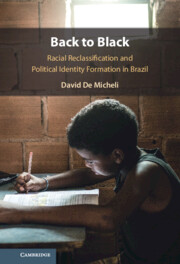Book contents
- Back to Black
- Back to Black
- Copyright page
- Epigraph
- Contents
- Figures
- Tables
- Acknowledgments
- 1 Introduction
- 2 The Puzzle of Racial Reclassification
- 3 Theory
- 4 Education as a Mechanism of Exposure
- 5 Education and Reclassification
- 6 Affirmative Action and Reclassification
- 7 Implications for National Politics
- 8 Conclusion
- References
- Index
4 - Education as a Mechanism of Exposure
Published online by Cambridge University Press: 14 November 2024
- Back to Black
- Back to Black
- Copyright page
- Epigraph
- Contents
- Figures
- Tables
- Acknowledgments
- 1 Introduction
- 2 The Puzzle of Racial Reclassification
- 3 Theory
- 4 Education as a Mechanism of Exposure
- 5 Education and Reclassification
- 6 Affirmative Action and Reclassification
- 7 Implications for National Politics
- 8 Conclusion
- References
- Index
Summary
Chapter 4 focuses on illustrating and testing the microlevel pathways that I detail in Chapter 3. I present in-depth interview data with thirty-four Brazilians, which generates the hypothesis and illustrates how exactly education impacts political identity and racial subjectivity. I present firsthand accounts of each pathway of exposure (information, social networks, and the labor market), and show how subjective personal experiences altered racial subjectivities and racialized understandings of power relationships. After illustrating the plausibility of these pathways, I draw on survey data from the 1980s, 1990s, and 2000s to systematically test the mechanisms uncovered through inductive research. My analysis shows that the direction of the relationship between education and identification indeed changed over time as public education became more inclusive, and that education correlates positively with racial consciousness and black identification by the 2000s.
- Type
- Chapter
- Information
- Back to BlackRacial Reclassification and Political Identity Formation in Brazil, pp. 95 - 131Publisher: Cambridge University PressPrint publication year: 2024

